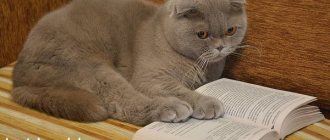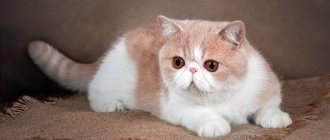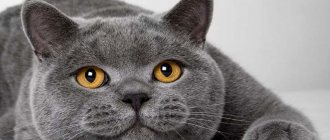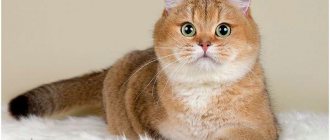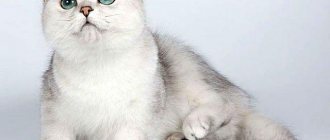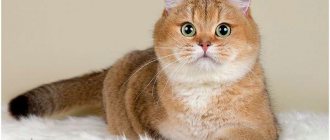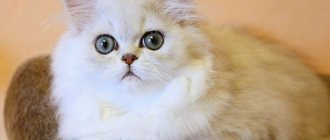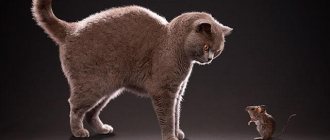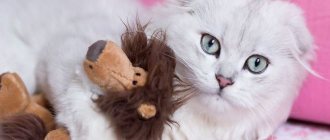- Wild animals
- >>
- Mammals
The British Golden Chinchilla is the name for the color of British cats, or simply a subspecies of the British. The breed itself is distinguished by its amazing kindness and complaisance. It is this color that arouses the greatest interest among breeders of purebred cats, as it is very rare. The homeland of this incredible beauty is considered to be Great Britain, which is where the name British cat comes from. She belongs to the young breeds. A distinctive feature is a very beautiful, fluffy and soft coat.
Origin of the species and description
Photo: British Golden Chinchilla
Breeders from Great Britain artificially bred it as a result of crossing Persians with the British. Today, there are several options for the origin of this type of breed. The origin story is described differently in different sources. Some indicate that the subspecies was first bred in England, while others indicate that scientists and breeders from America were involved in their breeding.
They were called chinchillas due to the fact that their color is very similar to the natural color of chinchillas. British scientists selected exclusively smoky or peach-colored cats for crossing. Initially, as a result of experiments, animals with green eyes and chinchilla color appeared.
Video: British Golden Chinchilla
The very first kitten was born as a result of crossing in 1882. A female kitten named Shannie was born from a Persian cat and a British smoke-colored cat. After this, breeders continued to work on developing ideal representatives of this breed. In 1889, a kitten was born who was named Silver Lambkin. It is this kitten that is considered the ancestor of this type of breed. It was presented as a result of breeding work at numerous exhibitions, where it became a multiple winner.
Interesting fact: Swedish Princess Victoria adored these animals and kept several representatives of this breed in her palace. The princess called them plushies and in every possible way contributed to their breeding and distribution.
For a long period of time, breeders sought to breed cats that would have emerald eyes. However, admixtures of different breeds did not allow achieving the desired result.
Cost of kittens
The price for a pet-class kitten will be 5-10 thousand rubles. The standard price for a breed-class cat varies between 20-30 thousand rubles. But if you dream of owning an elite show-class British dog, capable of taking first places at exhibitions and whose kittens will be lined up with connoisseurs, then the price will range from 50 to 100 thousand rubles. The specific amount depends on which nursery you will buy it from and how famous and titled its parents are.
Appearance and features
Photo: What does a British golden chinchilla look like?
The British Golden Chinchilla has external characteristics typical of British cats. Representatives of this breed have a rather large body and a wide chest. Cats have a straight back line and a defined hip line. The body is quite squat with well-developed muscles.
Representatives of this breed have characteristic features:
- neat rounded head shape with a wide, majestic forehead;
- pronounced, large cheeks and cheekbones;
- wide, short, straight nose;
- the tip of the nose is pink or peach-colored;
- the ears are small, rounded, widely spaced from each other;
- the neck is shortened, muscular and strong;
- large, expressive eyes that are quite deep-set;
- limbs are short and strong, rounded, arranged proportionally. In the spaces between the toes there are tufts of thick hair;
- the tail is short, not long, thick.
Individuals of this species exhibit pronounced sexual dimorphism. Males have larger body sizes and weight. The average body weight of males is 6-8 kilograms, females 3-3.5 kilograms. Spayed or neutered individuals can reach almost double their body weight. The coat of British cats is quite dense, short and dense with a well-developed undercoat.
Among the colors, I distinguish three main types:
- silver - white predominates in this color scheme. The color is distributed in such a way that the undercoat is completely white, and the tips are darker, almost black. The chest and abdomen area is crystal white, the pads of the limbs, on the contrary, are black. The area of the eyes and nose is highlighted with a black outline, as if outlined with a pencil;
- golden - undercoat of a pronounced, rich apricot color. The tail, side surface of the body and the back line are painted in a darker color. The chest and belly area is a softer, lighter caramel color;
- ash - when compared with the usual silver color, the coat is darker. This is due to the fact that the guard hair is colored one-third dark, and the silver color is characterized by the guard hair being dyed the main color by 1/8. There are stripes of a darker color on the body, although they do not have clearly defined boundaries. Between the toes the fur is dark, almost black;
- Zoologists and breeders identify another color - color point. They have more pronounced external characteristics of Siamese cats. They are distinguished by the presence of blue eyes. And a darker eye color in the area of the ears, tail and eyes.
Owner reviews
To get a complete picture of the breed, it would be a good idea to collect reviews from owners who are well aware of the advantages and disadvantages of British chinchillas.
Many of them note their excellent appearance. Not every breed can boast of such attractiveness. Plus, they look incredibly cute. The owners also note good health - with proper care, they rarely need to seek help from a veterinarian. A calm character and peaceful attitude towards children are perceived as additional advantages to the above.
True, speaking about the positive features of the breed, many also note the high cost - after all, this is an important disadvantage. And not every breeder likes a wayward character - many prefer more docile and obedient pets.
Concluding the article, we can say with confidence that the British chinchilla is an excellent breed. Willful and intelligent, friendly and beautiful, such a cat will become a faithful friend and decoration of any home.
Where does the British Golden Chinchilla live?
Photo: British Golden Chinchilla cat
As representatives of an aristocratic breed, cats need special living conditions. Before you get such a cat, you should think about whether you can provide him with the proper living conditions. A prerequisite for a comfortable existence is cleanliness and order. Another important criterion is the optimal room temperature. These cats are not intended to be kept in outdoor conditions. They cannot tolerate cold, so the room temperature must be at least 22 degrees.
Unlike other cats, they tolerate loneliness well, and even love it. The less people and attention there are for the Scots, the more comfortable they will feel. However, they require attention and participation from the owner in their life. Coming home from work, the owner must take pity on his pet and pay attention to it. Be sure to keep your cat's ears clean. This is the weak point of representatives of this breed. Often, due to untimely cleansing, cats develop infection, suppuration, and infectious processes.
Such an aristocratic animal definitely requires personal space. In this regard, it is necessary to take care of the arrangement of the “house”. It is best if it is located in a secluded place, hidden from prying eyes. It cannot be said that golden chinchillas are demanding in terms of living conditions and care. However, there are some guidelines that you need to follow.
Animals' eyes should be wiped with a cotton pad moistened with boiled water. A weak solution of chamomile can be used as a solution. Cats need to brush their teeth once a day. Teeth cleaning is carried out with special hygiene products that are sold in veterinary pharmacies. Animals' nails should be trimmed at least once a month.
How to cope with loneliness
An important advantage of the breed is the ability to enjoy not only a large company, but also loneliness. Yes, if you leave your pet alone for the whole day, you don’t have to worry that he will tear the upholstery on the sofa, knock over a flower and turn important documents into confetti. The British chinchilla calmly accepts loneliness and will take advantage of the free time to clean itself up, get a good night's sleep, sit on the window, calmly watching what is happening in the yard. In a word, an ideal pet for people with irregular work schedules.
What does the British golden chinchilla eat?
Photo: British Golden Chinchilla
Cats should be fed only fresh, high-quality food or ready-made balanced food specifically for cats. For nutrition to be balanced, the food must contain at least 35% protein.
Interesting fact: The owner is strictly prohibited from mixing different types of ready-made food for one feeding. This can cause illness and digestive problems.
You also need to count calories. This is not difficult if you use ready-made food as a source of nutrition. The average number of calories for one adult is 70 kcal per kilogram of live weight. It is also necessary to ensure constant access to fresh, clean water. It must be changed daily. It is better to pour bottled or filtered water into the bowl. You can’t exclude natural foods from your diet. If the diet is balanced, the animal will be healthy and active.
What is included in the animal’s natural diet:
- raw lean meat;
- boiled or stewed offal (liver, heart, lungs);
- sea white fish, which is cleaned of bones;
- dairy products with a low fat content (cottage cheese, yogurt without fillers, sour cream);
- two or three times a week you can give cats boiled eggs (preferably quail);
- boiled vegetables several times a week (preferably homemade vegetables - potatoes, carrots, potatoes);
- boiled porridge (buckwheat, rice, millet).
Interesting fact: Before giving raw meat to your cat, you need to freeze it for 10 hours to disinfect it. Before serving, it is defrosted and poured with boiling water. Be sure to cut the meat into small pieces.
If the animal has silky, soft and shiny fur, then the cat is well-nourished, and its diet is filled with everything it needs. There is a list of products that are strictly contraindicated to be included in the diet of animals.
What is forbidden to give:
- canned food;
- smoked meats;
- sausages and sausages;
- hot, salty and spicy dishes;
- raw cow's milk;
- canned meat or fish.
This breed of cat is prone to overeating and obesity. In this regard, the owner must himself dose the amount of food required for the normal growth and development of his pets. It is better to feed them in small portions five to six times a day. Be sure to sow special cat grass in the autumn-spring period, which cats can nibble.
Now you know what to feed your British golden chinchilla. Let's see how to breed these cute cats.
Health
Both British and Persian chinchilla breeds require the attention of their owners. Competent care and thoughtful nutrition in most cases guarantee that a cat will live 12-15 years.
It is very important to regularly take your pet for veterinary examinations, because... There are some diseases characteristic of chinchillas. These are polycystic kidney disease, cardiovascular diseases and retinal atrophy.
It is also necessary to ensure that cats do not develop caries; to do this, accustom your cat to brushing its teeth from early childhood.
Features of character and lifestyle
Photo: British Golden Chinchilla cat
British golden chinchillas are distinguished by a gentle disposition, which is combined with independence and pride. With good care and love, the animal sincerely becomes attached to its owner with all its heart, at the same time considering itself to be his equal. Cats of this breed are very calm, balanced and not at all emotional. It is unusual for them to show their feelings; in any situation they prefer to take the position of an observer and not take any part in the affairs of others. Many cats perceive observation as their immediate responsibility.
To live in harmony with such an amazing beauty, you must sincerely love animals. It is unlikely that such a cat will be perceived as a plush toy. Cats endure all forced squeezing, hugging and expression of their feelings with their characteristic composure and detachment. They do not particularly welcome this method of communication, but they do not show aggression. These cooks don't like too much attention, a lot of people and noise around. They are lovers of a measured, understandable and familiar way of life.
It is unlikely that you will be able to achieve anything from animals using force and pressure. An animal listens to a person and does something only if the person is perceived by them as an authority. Chinchillas are very smart and quick-witted, making them highly trainable with the right approach. They are always ready to make contact if they respect and love their owner.
Golden chinchillas are real aristocrats, as they quickly get used to order and try to adhere to it throughout their lives. They will never cause mischief or damage property. Animals are considered very proud, it is unusual for them to beg and beg for food, they will not be content with scraps from the master’s table, even if they are too hungry. Communication with children is perceived by cats as incredibly evil. They do not like children too much, but they tolerate them, trying at every opportunity to simply hide from their obsessive attention and genuine interest.
Attitude towards children
Almost always, British chinchillas have a peaceful relationship with children. They are smart enough to forgive human kittens some mistakes. Therefore, if they try to pull the tail or lift it, awkwardly grabbing the stomach, the cat will probably not use its teeth or claws. Instead, he will hastily, but with a certain grace, retreat to a place that is inaccessible to children. The main thing is to teach the latter that the pet has a certain place where he can be alone - for example, a box or a cat house. Now, if an overly intrusive child tries to pull the cat out of the shelter, which she is accustomed to consider inviolable, there is already a possibility of conflict. But in general, the British chinchilla is not at all predisposed to aggression.
Social structure and reproduction
Photo: British Golden Chinchilla kitten
It is recommended to breed animals by professionals who have experience in this field. The British Golden Chinchilla is bred mainly in specialized nurseries. Before breeding cats at home, you should study the intricacies of this matter. Zoologists warn that this breed is not fully formed. During mating and pregnancy, cats need special care and attention. The first step is to take care of choosing suitable partners for breeding.
Criteria for selecting partners:
- the presence of all the characteristics characteristic of this breed in candidates for mating;
- absence of diseases and hereditary pathologies;
- healthy appearance;
- activity;
- availability of all necessary documentation;
- availability of a vaccination passport and all vaccinations in it.
Golden chinchillas are characterized by late development. It is recommended to get them at a time when they become independent, can go to the toilet on their own and eat adult food.
Playfulness
What British chinchillas love is to play. Seeing a thread with a bow at the end or another toy, they instantly forget about their solidity, sophistication and aristocratic manners. There is only a cat and his toy. Even older animals, not to mention kittens, are ready to chase a target for a long time, catching it, throwing it, temporarily releasing it and attacking again. Playing together will give a lot of pleasure to both the owner and the pet.
But this can also be called a disadvantage. You need to regularly spend at least a little time playing with your cat. Otherwise, the relationship may deteriorate - the cat will no longer perceive the owner as a close friend. And lack of mobility often leads to excess weight gain, which affects the well-being and health of the pet.
Therefore, it is best to get British chinchillas for large families with many children who are ready to regularly find time to play with their favorite pet.
Natural enemies of British golden chinchillas
Photo: What does a British golden chinchilla look like?
Due to the fact that animals live exclusively in domestic conditions, they have practically no natural enemies. By nature, cats are endowed with strong immunity and an incredibly stable psyche. However, they will require certain living conditions, regime and diet. If the rules for keeping animals are not followed, the risk of developing various diseases increases.
The following diseases are typical for this breed:
- polycystic kidney disease;
- retinal atrophy of the eyeballs;
- diseases of the gastrointestinal tract;
- malignant neoplasms;
- hypertrophic cardiomyopathy.
Each of the above diseases can lead to the death of the animal. If your cat becomes lethargic, indifferent to everything, her appetite decreases, and she refuses her favorite treats, you should immediately contact a veterinarian. Representatives of this breed are very sensitive to drafts. They can get pneumonia if kept in drafty or damp conditions.
To exclude oncological formations of the reproductive system, it is recommended to castrate cats and sterilize cats if you do not plan to breed them. It is best to have surgery at 6-7 months of age. It is also recommended to promptly take animals to the veterinarian for vaccination. In addition, it is necessary to regularly brush your pets' fur. Otherwise, when licking yourself, the hair gets into the stomach and can cause serious health problems and disrupt the functioning of the digestive tract.
Attitude towards other animals
How relationships with other pets will develop depends solely on their behavior. The British chinchilla does not have a tendency to conflict. However, this aristocrat will not tolerate infringement of his rights. Relationships with large dogs are friendly. A cat and a dog can become friends - sleep together, eat from the same bowl. With small dogs that bark a lot and often try to assert themselves at the expense of others, relationships will most likely be strained, and there is even the possibility of conflicts.
British chinchillas are reserved with cats, but, as a rule, they do not show excessive affection. Relations are calm, even, but not too friendly. Although, if the neighbors try to dominate and oppress a native of Britain, things may end in a fight.
British chinchillas will not make friends with small rodents, such as rats, mice or hamsters - they are perceived exclusively as potential prey. Therefore, it is better not to leave your pets alone, at least if the lives of small animals are not protected by the glass of the aquarium or the metal bars of the cage.
